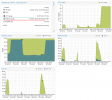We addressed both regression that happened on somewhat specific setups now and where the source of most reports seen here, so currently no outstanding regression in that area is known. Namely:Seems like it still isn't safe to upgrade to 7.1? Anyone that has done the upgrade NOT having disk issues?
pve-qemu-kvmin version6.1.0-3fixes an issue that showed up with using VirtIO-block and VMs that had no much room to breathe CPU- and memory wise. We got positive feedback about that in the respective bug entry and some forum threads here.pve-kernel-5.13.19-1-pvein version5.13.19-3addressed an issue that happened mostly with VMs using io-uring as async-IO driver and the SATA bus for disks. Initially it was assumed that Windows has to be in the mix here, but that was rather correlation with the SATA bus, as that is more commonly used in Windows, Linux has native VirtIO SCSI/Block support after all.
Last edited:


